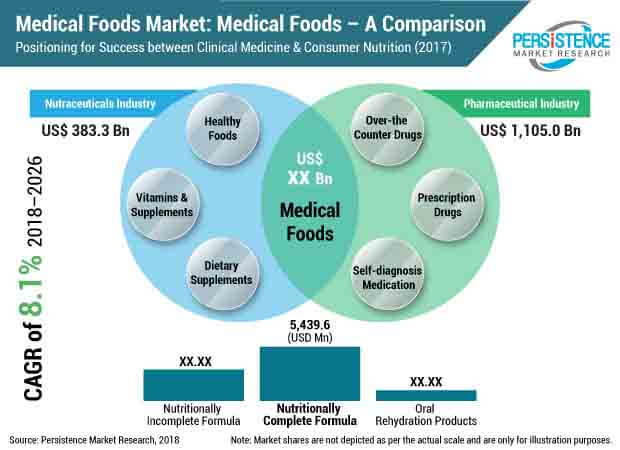Medical Foods Market Segmented By Nutritionally Complete Formulas, Nutritionally Incomplete Formulas, Oral Rehydration Products Type in Powders, Liquid, Capsule, Tablet, Bar Form in ADHD, Depression, Diabetes, Cancer, Alzheimer’s Disease, Metabolic Disorder
Industry: Healthcare
Published Date: January-2019
Format: PPT*, PDF, EXCEL
Delivery Timelines: Contact Sales
Number of Pages: 218
Report ID: PMRREP26854
The market for medical foods is expanding to geographical regions where methods for nutritional care are not present. Most of the market is consolidated with a few players. A majority of the medical foods market is concentrated in geographical locations such as the U.S. and Europe.
Prescription drugs are subsidized by healthcare plans from insurance companies based on each region’s reimbursement plan. Therefore, the inclination to adopt such insurance-mandated medical food reimbursement policies creates a positive environment for the company involved in the market. These kinds of initiatives affect the overall market, where market participants benefit from plans that help the overall medical foods market.
Policy differences allow manufacturers to lower the prices of their medical food products, which would enhance the affordability for consumers and assist market infiltration. Though, the case is not so easy for insurance companies who are consistently opposing such regulations for medical foods, as this would practically decrease their profits.
The absence of regulations and proper standards for medical foods makes the situation trickier. Perhaps it would easily allow other items that may not be authentic medical foods to be added in the list of medical foods.
Medical foods were initially developed to address certain indications such as malnutrition among children and inborn error metabolism. Within the medical foods industry, companies who lead the market such as Nestlé, Abbott, and Fresenius Kabi have established themselves as strong resources for medical food products for diseases, including maple syrup urine disease (MSUD) and phenylketonuria (PKU).
Companies with broad product portfolios for different indications allow them to have a strong grip in the medical foods market, and have a continuous revenue flow through concerned business segments. If those methods of product development change with unmet indication categories, it is likely that the demand for better services and product candidates would significantly rise. The market for medical foods is in the growing phase, where manufacturers are coming up with products used for new disease indications.
Thus, product development among most of the companies involved in the market for medical foods helps in leading their way through this market.
The medical foods market is not a regular market as far as marketing regulations are concerned. It has a series of labeling requirements, consolidated and dominated by global manufactures, and provides accessibility to reasonable products which decreases profitability for manufacturers.
Companies such as Nestlé S.A., Abbott, and Danone S.A. account for a majority of revenue in the medical foods market. Smaller companies in the medical foods market such as Targeted Medical Pharma Inc., Primus Pharmaceuticals, Inc., and Fresenius Kabi AG show big potential, which would help in product variations and break the consolidated nature of the medical foods market.

The report provides a detailed understanding of most competitors in the medical foods market. The study provides complete data on each market participant in the medical foods market. Companies like Nestle S.A., Abbott Laboratories, Alfasigma spA, Cerecin Inc., Danone S.A., Targeted Medical Pharma Inc., Primus Pharmaceuticals, Inc., Fresenius Kabi AG, Metagenetics, Inc. and Reckitt Benckiser Group plc are included in the study.
The report provides readers with all-encompassing data on each medical food product manufacturer’s revenue share, winning strategies, and latest information on key strategies in the concerned market. A comprehensive analyst opinion on the concerned topic is also provided with brief insights.
The market study on medical foods was recently published by the company. It provides comprehensive information about the most important market dynamics that prove instrumental in the growth of the concerned market during 2018-2026.
Companies in the medical foods market can find the most accurate quantitative and qualitative information about the growth parameters of other medical food manufacturers, which can help them develop business strategies in the coming future.
The company’s report on the medical foods market provides in depth information on the current market scenario. The medical foods market is segmented by geographical region, product type, form, application, and distribution channel. This provides a vigorous segment-wise analysis and growth reasons for each segment in the medical foods market.
Based on geographical region, the medical foods market is segmented into five regions – North America, Latin America, Europe, Asia Pacific, and the Middle East & Africa (MEA). By product type, the market is segmented into nutritionally complete formulas, nutritionally incomplete formulas, and oral rehydration products. Depending on application, the medical foods market is segmented into ADHD, depression, diabetes, cancer, Alzheimer's disease, metabolic disorders, and others.
By form, the medical foods market is segmented into powders, liquid, capsules, tablets, and bars. By distribution channel, the medical foods market is segmented into hospital pharmacies, retail pharmacies, online pharmacies, drug stores, and supermarkets.
Readers can find detailed information about the important factors affecting the medical foods market during the forecast period. Additionally, the concerned market report also contains valuable information that can provide medical foods manufacturers with answers to critical questions, such as:
The process of market research followed at the company commences with extensive secondary research of the medical foods market. Analysts obtain industry-validated historic and current data about the demand for medical foods across the globe.
Comprehensive secondary research is followed by extensive and in-depth primary research, where detailed information about the medical foods market is obtained in terms of value (US$ Million). Based on thorough secondary and primary research of the growth parameters of the medical foods market, analysts come up with the most precise forecast on how the medical foods market will grow during the forecast period.
To know more about delivery timeline for this report Contact Sales
